
basis voor actuele kunst, Utrecht (BAK) is a leading international platform for theoretically informed, politically driven art and experimental research. Based in Utrecht, BAK addresses the social, ideological, and environmental urgencies of the present by combining public programming and exhibition making with research, learning, and talent development. Working with communities involved in arts, activisms, and academia—and bringing artists, scholars, and members of the precarious classes together—BAK cultivates art as a public sphere and a space for politico-aesthetic experiments.
PROJECT LEAD
Maria Hlavajova
 Maria Hlavajova is founding General and Artistic Director of BAK, basis voor actuele kunst, Utrecht, since 2000. In 2008–2016 she was Research and Artistic Director of FORMER WEST, which she initiated and developed as an internationally collaborative research, education, publication, and exhibition project, culminating with the publication Former West: Art and the Contemporary After 1989 (co-edited with Simon Sheikh (BAK & MIT Press, 2017). Hlavajova has instigated and (co-)organized numerous projects at BAK and beyond, including the series Propositions for Non-Fascist Living (2017–ongoing), Future Vocabularies (2014–2017), New World Academy (with artist Jonas Staal, 2013–2016), among many other international research projects. In 2011, Hlavajova organized the Roma Pavilion titled Call the Witness in the context of the 54th Venice Biennale, Venice and in 2007 she curated the Dutch Pavilion Citizens and Subjects at the 52nd Venice Biennale, Venice. In 2000, Hlavajova co-curated Manifesta 3 in Ljubljana, titled Borderline Syndrome: Energies of Defense. In addition, Hlavajova is co-founder (with Kathrin Rhomberg) of the tranzit network, a foundation that supports exchange and contemporary art practices in Austria, Czech Republic, Hungary, and Slovakia. Previously, she was a faculty member at the Center for Curatorial Studies, Bard College, Annandale-on-Hudson, NY (1998–2002), and director of the Soros Center for Contemporary Arts in Bratislava (1994–1999).
Maria Hlavajova is founding General and Artistic Director of BAK, basis voor actuele kunst, Utrecht, since 2000. In 2008–2016 she was Research and Artistic Director of FORMER WEST, which she initiated and developed as an internationally collaborative research, education, publication, and exhibition project, culminating with the publication Former West: Art and the Contemporary After 1989 (co-edited with Simon Sheikh (BAK & MIT Press, 2017). Hlavajova has instigated and (co-)organized numerous projects at BAK and beyond, including the series Propositions for Non-Fascist Living (2017–ongoing), Future Vocabularies (2014–2017), New World Academy (with artist Jonas Staal, 2013–2016), among many other international research projects. In 2011, Hlavajova organized the Roma Pavilion titled Call the Witness in the context of the 54th Venice Biennale, Venice and in 2007 she curated the Dutch Pavilion Citizens and Subjects at the 52nd Venice Biennale, Venice. In 2000, Hlavajova co-curated Manifesta 3 in Ljubljana, titled Borderline Syndrome: Energies of Defense. In addition, Hlavajova is co-founder (with Kathrin Rhomberg) of the tranzit network, a foundation that supports exchange and contemporary art practices in Austria, Czech Republic, Hungary, and Slovakia. Previously, she was a faculty member at the Center for Curatorial Studies, Bard College, Annandale-on-Hudson, NY (1998–2002), and director of the Soros Center for Contemporary Arts in Bratislava (1994–1999).
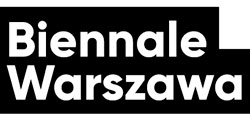
Biennale Warszawa was established in the late autumn of 2017 and it is a cultural institution financed from the Warsaw municipal budget. It was designed as an interdisciplinary hub working in a continuous manner at the intersection of various disciplines, with a distinct socio-political profile. It collaborates with other cultural institutions, non-governmental organizations, and social initiatives, and prepares an „interdisciplinary event in the form of a biennale”. Biennale Warszawa is an institution integrating artistic ideas with research, discursive and publishing activity, in accordance with a practice well-known and established in the art world. Primarily, however, it enabled the creation of a new type of institution that operates in parallel in the artistic and political areas, while attempting to reclaim influence not only through public debate but also social and political life.
Using the known and disputable biennale format, the Biennale Warszawa team applies it in a specific way. The main emphasis is placed on the ongoing programme of the institution, executed between subsequent editions of the festival. Therefore, „Biennale Warszawa” is, first and foremost, the name of a public institution of culture. Secondly, it encompasses two-year-long cycles of ongoing artistic, research and socio-political activities conducted collectively by the curatorial team. Finally, it designates the biennale itself, which in this instance is a complement, extension, and summary of the programming carried out over two years, rather than a separate event, entered into calendar of great exhibitions or festivals entrusted to eminent curators.
PROJECT LEAD
Kuba Szreder
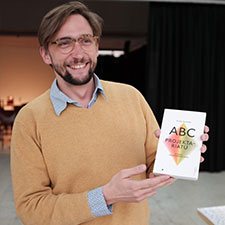 Kuba Szreder is lecturer at the department of art theory at the Academy of Fine Arts in Warsaw and collaborates regularly with Biennale Warsaw. Graduate of sociology at the Jagiellonian University (Krakow), he received his PhD from Loughborough University School of the Arts. He combines his research with independent curatorial practice. In his interdisciplinary projects he carries out artistic and organizational experiments, joining art with other walks of life. In 2009 he initiated Free/Slow University of Warsaw, with which he completed several inquiries into the political economy of contemporary artistic production, such as Joy Forever. Political Economy of Social Creatvity (2011) and Art Factory. Division of labour and distribution of resources in the field of contemporary art in Poland (2014) and he is also editor and author of several catalogues, readers, book chapters and articles. In his book ABC of Projectariat (Polish edition, 2016), he scrutinizes economic and governmental aspects of project-related modes of artistic production.
Kuba Szreder is lecturer at the department of art theory at the Academy of Fine Arts in Warsaw and collaborates regularly with Biennale Warsaw. Graduate of sociology at the Jagiellonian University (Krakow), he received his PhD from Loughborough University School of the Arts. He combines his research with independent curatorial practice. In his interdisciplinary projects he carries out artistic and organizational experiments, joining art with other walks of life. In 2009 he initiated Free/Slow University of Warsaw, with which he completed several inquiries into the political economy of contemporary artistic production, such as Joy Forever. Political Economy of Social Creatvity (2011) and Art Factory. Division of labour and distribution of resources in the field of contemporary art in Poland (2014) and he is also editor and author of several catalogues, readers, book chapters and articles. In his book ABC of Projectariat (Polish edition, 2016), he scrutinizes economic and governmental aspects of project-related modes of artistic production.
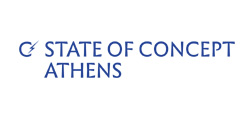
State of Concept is a non for profit contemporary art institution the first of its kind in Greece. It was founded in 2013 by art critic and curator iLiana Fokianaki and is located in Athens, with its main aim being to introduce international artists that are not widely known and easily accessible to Greek audiences, and also provide support for innovative social projects. Parallel to this, State of Concept organizes a variety of events and interventions including talks, screenings and workshops, and also operates as a space for free artist consultations, where young students and graduates of Greek art schools can receive feedback, guidance and help in order to further their work, enhance their portfolio and CV, and decide their next artistic steps.
PROJECT LEAD
iLiana Fokianaki

Iliana Fokianaki is a curator and theorist based in Athens and Rotterdam. In 2013, she founded State of Concept Athens, the first non-profit institution in the city that promotes Greek and international artists through solo exhibitions, but also invites international curators to create exhibitions that comment on the current socio-political landscape of Greece and beyond. In 2016, together with Antonia Alampi she founded Future Climates, a platform that aims to propose viable futures for small-scale organizations of contemporary art and culture, which was first presented in Athens in March 2017 with a three-month school. She was curator of Extra City Kunsthal in Antwerp (2017-2019) and is a lecturer at the Dutch Art Institute, and has taught, lectured and taken part in panel discussions in various independent spaces and institutions worldwide.

Tensta konsthall is a centre for contemporary art in the Stockholm suburb of Tensta, Northwest of the City. Tensta konsthall was founded in 1998 and is known to combine a high-profile program of international contemporary art with the ambition to be a real presence in its local community. The organization has been characterized by its participation in a national and international exchange on what contemporary art is, can be, and how to work with it. Tensta konsthall aims to mediate a program based on a spirit of critical inquiry in ways which can be meaningful and relevant precisely in Tensta while maintaining respect for art, artists, and visitors alike.
PROJECT LEAD
Cecilia Widenheim

Cecilia Widenheim is director of Tensta konsthall. During her time as director of Malmö Konstmuseum (2012-2018) she initiated and curated several projects contextualising the collection. She was director of Iaspis 2008-2011 and prior to that curator, responsible for the Swedish and Nordic collection of paintings and sculptures, at Moderna Museet in Stockholm 1997-2012. She has curated exhibitions with artists such as Ester Almqvist, Mary Kelly, Vera Nilsson, Yoko Ono, Martha Rosler, Cecilia Edefalk and Ann-Sofi Sidén. She has taught widely since the 1990s and co-edited a number of books such as Migration – Traces in an Art Collection (Sternberg Press 2020), The Society Machine – The Industrial Age from the Perspective of Art (Garrett Publications 2018), Baltic Reflections (Arena 2014), Work, Work, Work – A Reader on Art and Labour (Sternberg Press 2012), Utopia and Reality – Modernity in Sweden (Yale University Press 2002).
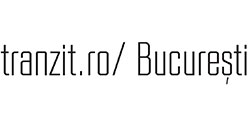
tranzit is a unique network of civic associations working independently in the field of contemporary art in Austria, the Czech Republic, Hungary, Slovakia and Romania and across the borders of a wider Europe. Its main goal is to support and articulate emancipatory practices, establish connections between culture and society by moving across geographies, generations, and political realms. Each tranzit works under its own conditions in a variety of local cultural and social contexts, using different formats and methods to contextualize, generate or host theoretical, artistic and activist debates around today’s urgencies.
tranzit.ro has the particularity of being in its turn a network. Founded in 2012 in Iasi, TRANZIT.RO Association is active in three permanent spaces in Romania (in the cities of Bucharest, Cluj, Iasi), with an additional annual project taking place in Sibiu and numerous national and international collaborations.
tranzit.ro is based on solidarity and sharing of resources and it maintains its balance through keeping the autonomy of each centre and opening up for collaborations with different organizations. Its main purpose is maintaining a decentralized institution: which is in each place a hub for ideas on positive social change; which provides a safe space for experiment and exchange; which is dedicated to an integrated and open understanding of contemporary art as a gateway to a whole spectrum of knowledge; and which is raising awareness on the responsibilities and rights of today’s citizens.
PROJECT LEAD
Raluca Voinea
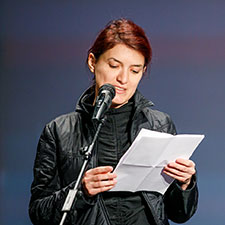
Raluca Voinea is curator and art critic, based in Bucharest. Since 2012 she is co-director of tranzit.ro Association. From 2012 to 2019 she managed tranzit.ro space in Bucharest, which included an art gallery, a communitarian permaculture garden and an Orangery (a space for hosting fragile plants and ideas), all developed organically and in response to both the local context and to more international frameworks. The institution will relocate to another space in 2020. Since 2008 she is co-editor of IDEA arts + society magazine and since 2012 the coordinator of the (Expozitii) collection published by IDEA Publishing House. In 2013 Raluca Voinea was the curator of the Romanian Pavilion at the 55th Venice Biennale with the project An Immaterial Retrospective of the Venice Biennale by artists Alexandra Pirici and Manuel Pelmuş.
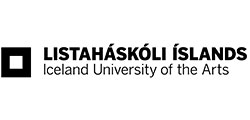
The Iceland University of the Arts (IUA) is a self-governing institution providing higher education in fine arts, theatre, dance, music, design, architecture, and arts education. The University seeks to encourage progressive thinking in the arts and to stimulate artistic research as embedded in artistic and academic contexts. The University conveys knowledge and expertise in the arts in Icelandic society, placing priority on national and international collaborations, such as this project on socially engaged art run in partnership with the University of Iceland.
PROJECT LEAD
Bryndís Snæbjörnsdóttir

Bryndís Snæbjörnsdóttir works in a collaborative art partnership with the artist Mark Wilson. Their 20-year interdisciplinary art practice is research-based, exploring issues of history, culture and environment in relation to both humans and non-human species. Working very often in close consultation in the field, with experts including professionals and amateurs, they use their work to test cultural constructs and tropes, and human behaviour in respect of ecologies, extinction, conservation and the environment. With a particular focus in the north, their projects and artworks have nevertheless been commissioned, generated and exhibited internationally and as frequent speakers at conferences worldwide, their works have been widely discussed in texts across many disciplinary fields. In 2019 they received a substantial grant from the Icelandic Research Fund (Rannís) for their project Visitations: polar bears out of place. Their artwork is installation based using variety of media including photography, video, text, drawing, objects and sound. Dr. Bryndís Snæbjörnsdóttir is Professor of Fine Art at the Iceland University of the Arts.

Vessel is a non-profit, independent cultural organization dedicated to contemporary art, particularly socially engaged art, which started in April 2011 in Bari, Italy, via funding from ‘Principi Attivi 2010’ issued by the Puglia region (Southern Italy). W-Est provides a platform for the development of socially engaged practices and critical discourses on contemporary art in relation to the cultural, social, economic and political issues that affect people on a regional and transnational level. Thus, reflection on transnational issues, have evolved via practices that are imbricated in local geographies and their social relations in the Southern Italian context of extensive regeneration and cultural development. Vessel intends to create a virtual-sharing platform in order for other institutions to support each other within an already established Euro-Mediterranean network.
PROJECT LEAD
Anna Santomauro

Anna Santomauro is curator, educator and researcher in socially engaged art. In 2011, she co-founded Vessel in Bari, Italy, a non-profit art organization dedicated to public programming in relation to contemporary social, political, and economic issues. In 2015-2016, Santomauro was Public Programmer at Eastside Projects (Birmingham). She has developed several projects and curated multiple exhibitions. In 2013, she was one of the recipients of ICI/Dedalus Research Award. She lectures, gives talks, tutors and leads workshops in several institutions, including: CCS Bard College (NYC), Piet Zwart Institute (Rotterdam), Newcastle University, Salt Galata (Istanbul), University of Cambridge, La Casa Encendida (Madrid).


















